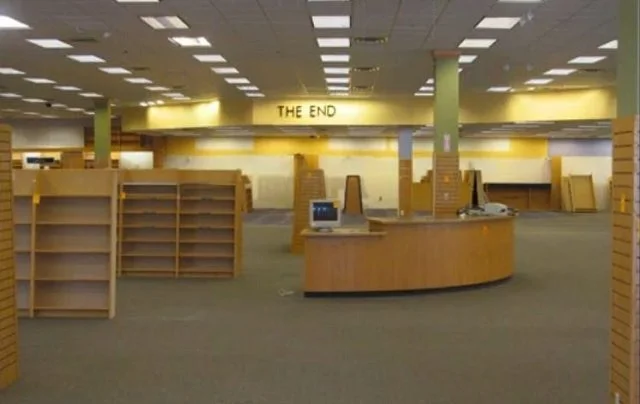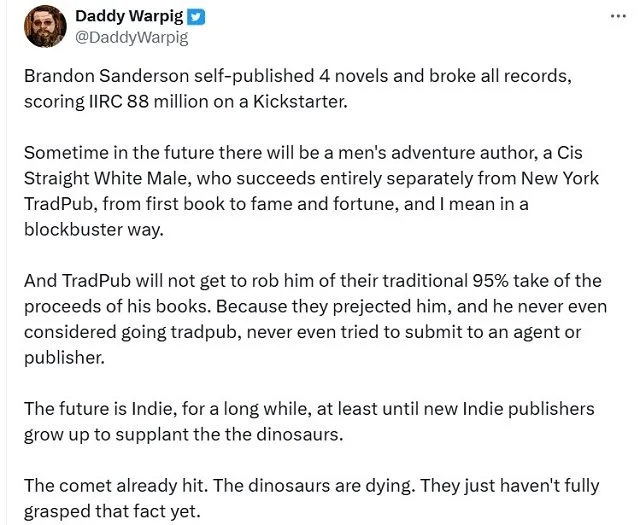Why Newpub Is the Only Way Forward
Spend any time in the publishing discourse online, and you’ll notice a curious phenomenon. Some people still cling to the delusion that New York publishing houses can be reformed. That if we just yell loud enough about “wokeness,” or if some clever entrepreneur builds a boutique press catering to the disaffected midlist, everything will go back to normal.
These people might as well be praying for the Second Coming of Borders Books.
In a recent thread, the irrepressible Daddy Warpig offered a vision of the future that’s no longer speculative—it’s already unfolding. Brandon Sanderson didn’t merely break the mold when he Kickstarted four novels to the tune of eight figures. He destroyed it. Sanderson proved conclusively that not only is legacy publishing unnecessary, it’s counterproductive for any author who values autonomy and prosperity.
Screen shot: @DaddyWarpig on X
The irony is that Sanderson wasn’t even trying to be an iconoclast. He was a New York Times bestseller. He’d already made it in the old system by every conventional measure. But when he stepped outside the ossified machinery of oldpub to test whether he could reach readers directly, the results were so explosive they’ve become an object lesson in the latent power of self-publishing.
Related: Do Authors Need the Oldpub Golden Ticket?
This is why the notion that there’s some rescue operation waiting to swoop in and rehabilitate Big Five publishing is an embarrassment at this point. As author Devon Eriksen succinctly explained in his follow up thread, it’s not ideology that made the old model obsolete. The ideology merely flooded into a waiting vacuum.
It’s the same story in every legacy institution. Once the economic fundamentals decay, the parasites and ideologues move in to pick the carcass clean.
Let’s restate Eriksen’s argument in the bluntest terms possible: New York publishing doesn’t do anything you can’t do yourself—or pay to have done for you—better and more cost-effectively.
Consider the core functions oldpub was supposed to provide:
Distribution: You needed a publisher to get your novel into bookstores back when that was the primary sales channel. But bookstores account for a diminishing fraction of book sales, and POD plus ebooks are the new standard. No gatekeeper required
Editing: Once, authors had to pay 85 percent per book they sold to get professional editing through a publisher. Now it’s a fixed cost authors can hire out on their terms—without ceding ownership or control
Cover design: Same deal. You can contract out professional design work that rivals or surpasses what most midlist olddpub authors ever got
Marketing: This is the most absurd proposition of all. Unless you’re one of the ten A-list names propping up a failing house, you will still be expected to do 100 percent of your own marketing. So why surrender 85 percent of your royalties for zero value added?
Advances: What most new authors have always missed is that a book advance is not a signing bonus. Instead, as author Joe Konrath has pointed out, it’s a loan you must pay back out of your royalties. Today, they’re doled out mostly to celebrity politicians for ghostwritten fluff nobody reads.
Yet even when presented with these undeniable facts, you’ll still hear aspiring writers whisper that a “based” imprint will pick up the slack. According to the fairytale, some entrepreneur will reverse-engineer the 20th century model—just without the New York Times Book Review snobbery—and everything will snap back into alignment.
Related: Dear Deadpub: Men Didn’t Stop Reading. They Stopped Reading YOU.
Here is the hard truth: The legacy publishing model is beyond rescue. Not because the managers are incompetent or ideological, though many are both, but because it is structurally unsound in an era when the friction of distribution has disappeared.
If you’re nostalgic for the pre-digital era, I understand. But know this: The same forces that destroyed the record industry’s model have demolished New York publishing. In music, the MP3 and iTunes rewrote the supply chain. In print, Amazon and eBooks did the same.
Small presses operating on the old model are just playing musical chairs while the Titanic sinks.
Eriksen nailed it: Personnel isn’t the problem. It’s the core value proposition.
Lest you still doubt us, answer this simple question: What does the old publishing establishment do that authors can’t do better on their own?
You know who can’t answer that question?
Publishers.
Either large or small.
Meanwhile, newpub authors who take the time and effort to learn the new book business have been out-earning their oldpub counterparts for years.
Brandon Sanderson’s historical Kickstarter haul wasn’t an isolated phenomenon. He demonstrated that the same technological levers available to every indie author can scale beyond oldpub’s worst fears.
Now, none of us is likely to replicate an $50 million campaign out of the gate. But Sanderson’s success has normalized the idea that readers want to support authors directly. They’re tired of middlemen. That preference cascade bodes ill for oldpub and heralds neopatronage coming into its own.
Once you internalize that truth, you realize why the last century’s model cannot be revived. The role of the publisher was to be the middleman, the arbiter, and the gatekeeper. But when the walls fall down, the gatekeeper is just another guy waving his hands, hoping you don’t notice he’s obsolete.
This is why I say over and over: If you’re serious about making a living writing fiction, you must build your own platform.
Screen shot: Dragonsteel Entertainment
Daddy Warpig’s metaphor is spot on. The comet has hit. The dinosaurs are already dying. They don’t know it yet because they’re still moving on inertia. But inertia always runs out.
The future is indie. And not just for a while, but indefinitely, or until some new, unforeseen business model emerges that actually serves readers and authors first.
If there was a small press out there offering an integrated suite of services: editorial, cover design, marketing, and distribution at a non-predatory price, you’d better believe I’d be singing their praises. But as Eriksen notes, such an outfit doesn’t exist.
Until it does, self-publishing is the only viable path.
But there’s another dimension that’s too often overlooked, even by well-meaning people.
Newpub isn’t a solo climb up a lonely mountain. To reach the next step, where indie authors can rival or surpass the cultural footprint of even A list deadpub dinosaurs, we have to understand that no one in mainstream entertainment will lift a finger to help us.
Why would they?
They are, as Eriksen described, trust fund babies playing out their ideological fantasies on their great-grandfathers’ dime. They aren’t motivated by profit. They’re motivated by status and cultural gatekeeping. And when you threaten their monopoly, they will do everything in their power to starve you of oxygen.
Which means that newpub authors need to support each other: strategically, systematically, and unapologetically.
And we do it by …
Cross-promoting
Sharing audiences
Signal boosting the success stories that prove oldpub’s irrelevance
Cultivating reader relationships no corporation can sever
Not shying away from offering each other direct financial support.
In short, it means recognizing that every newpub success chips away at the prestige regime the legacy houses have used to keep authors in thrall. Just as early YouTube dethroned legacy media on video, we can dethrone the paper monopolies.
But we can’t do it if we pretend that all we need is a different kind of gatekeeper. Nor can we succeed if we sit around waiting for some white knight to show up and save us.
And we certainly can’t win if we’re still seeking validation from the same institutions that have proven time and again that they hate us and everything we stand for.
Let me draw you a quick sketch of the new paradigm:
If you can build an audience, you can make a living as a writer.
If you can’t, you won’t.
The sooner you accept that reality, the more quickly you can begin to thrive.
When I first came on the scene, people thought the Kindle was a novelty; a passing fad. Ten years later, it’s the linchpin of the entire publishing industry. The next decade will belong to those who embrace that infrastructure and build their own independent platforms on top of it.
Every time you see an oldpub meltdown, every time you hear about another round of layoffs, imprint closures, or mergers, remember: This isn’t a sign of temporary turbulence. It’s terminal decline.
The comet hit a long time ago.
Stop betting on a real-life Jurassic Park.
Start thinking about how you will build a business that survives the impact and flourishes in the new era.
A publishing environment where you have more autonomy, flexibility, and control—but only if you’re willing to accept that no one is coming to save you.
First Impact has scoured the field clean. It’s time to build. Together.
You know that there’s no Manhattan publisher or Silicon Valley investor propping up my work. We’ve fought these ten years to restore the culture together. And that’s the only way we can keep winning.
Here on the bleeding edge of adventure fiction, we rise or fall together. Help write the next chapter of newpub history. Claim your only chance to get the signed and numbered Nethereal Special Edition and the new Kairosis novella, and support Nethereal now on Kickstarter.






